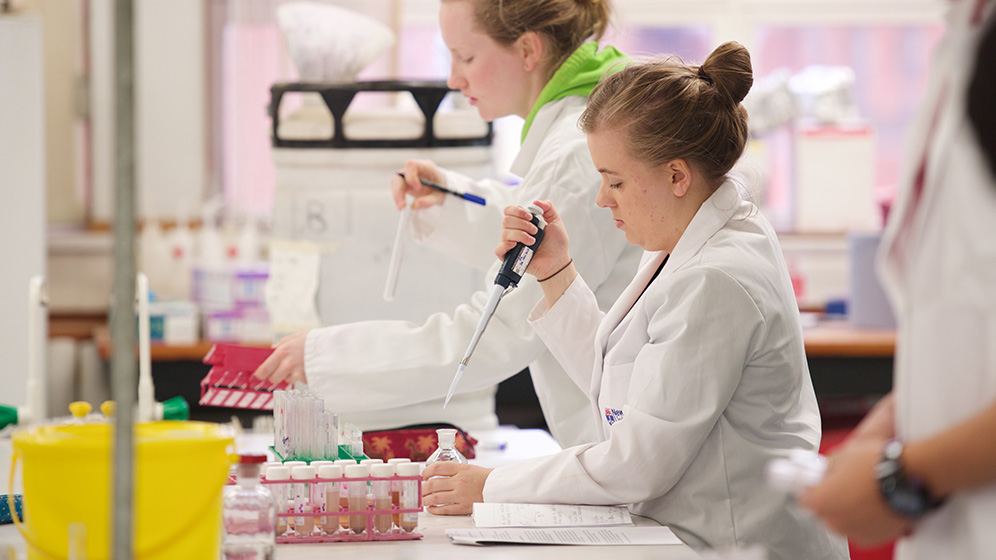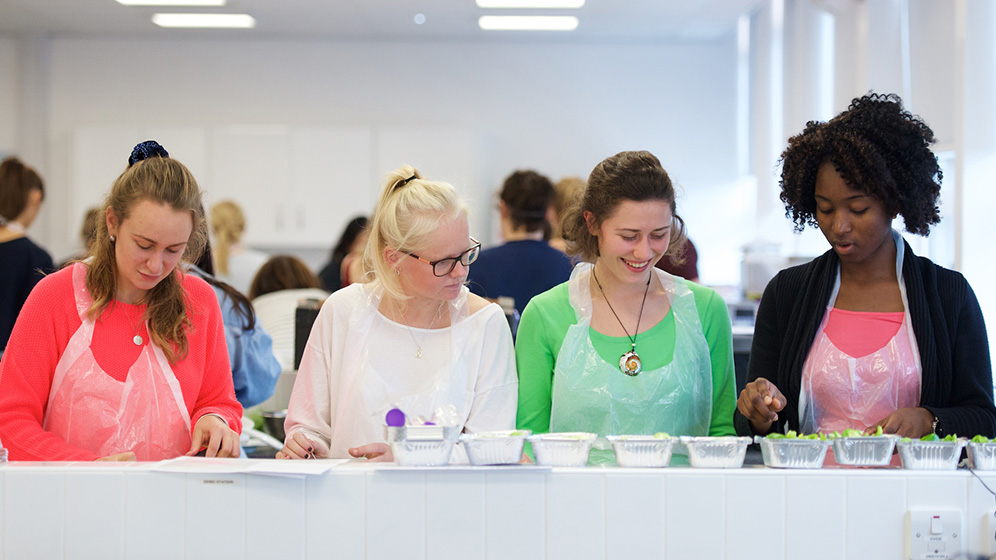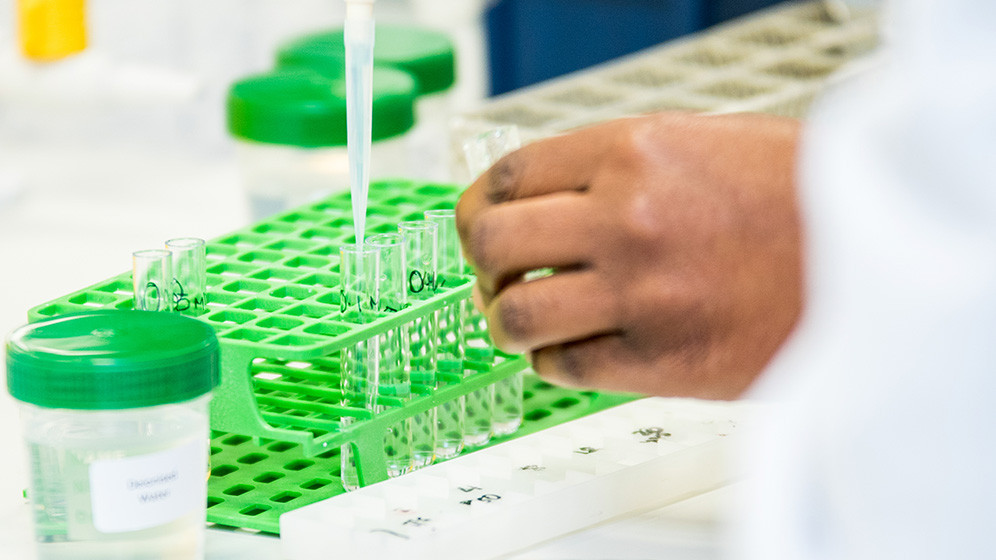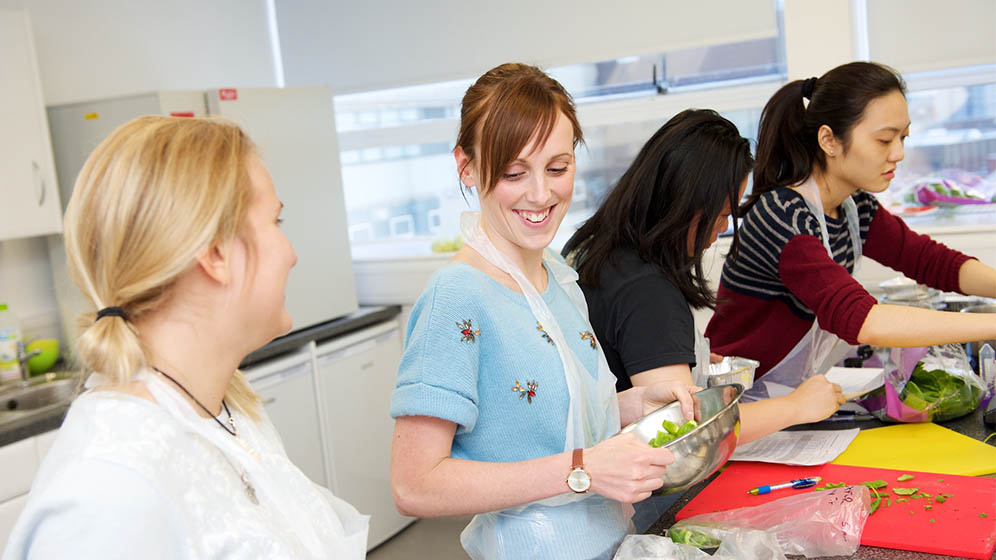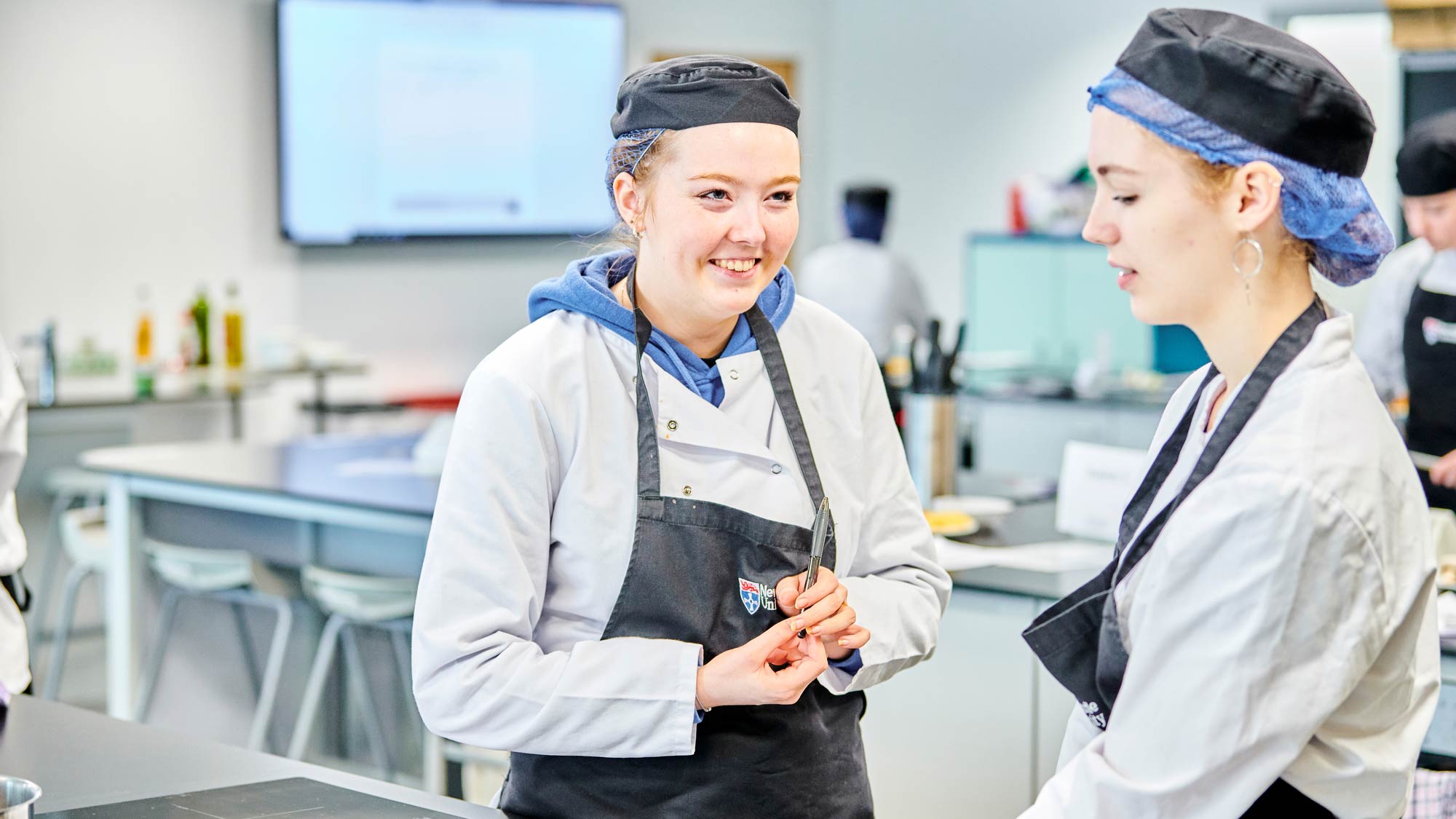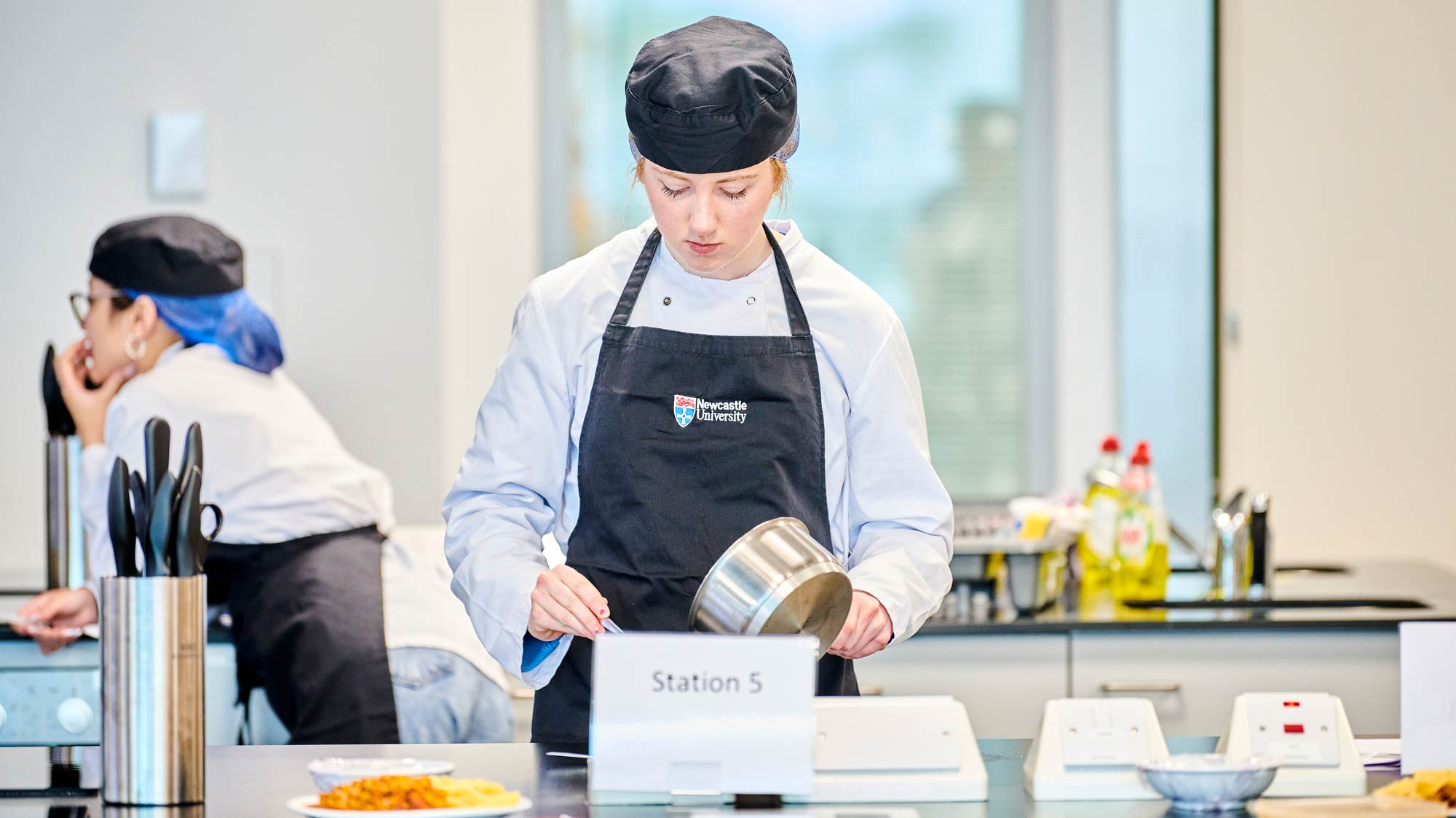Dietetics MDiet
- UCAS code: B401
- Full time
- 4 years
This integrated master's dietetics degree will equip you with the specialist knowledge and skills needed to become a competent and effective dietitian.
You are currently viewing course information for entry year: 2026
Next start date:
- September 2026
UCAS Institution name and code:
- NEWC / N21
Course overview
This degree focuses on the effect of nutrition on the functioning of the human body in health and disease. It equips you with specialist knowledge and skills in preventing, treating and managing ill health with food, nutrients and dietary change.
This is the first undergraduate Dietetics programme in the North East of England. You'll benefit from newly built, state-of-the-art facilities and our world-class research. Innovative and exciting teaching practices, including the use of case-based teaching, simulated learning opportunities, and integrated practice placements ensure you're well prepared for your future career.
Dietetics is a broad-based subject and you'll study topics ranging from the natural and clinical sciences through to the social sciences. This degree includes a year of study at master’s level to enhance your leadership skills and ability to influence future dietetic practice, as well as offering significant research experience.
Our Dietetics courses sit in the School of Biomedical, Nutritional and Sports Sciences.
Your course and study experience - disclaimers and terms and conditions
Please rest assured we make all reasonable efforts to provide you with the programmes, services and facilities described. However, it may be necessary to make changes due to significant disruption, for example in response to Covid-19.
View our Academic experience page, which gives information about your Newcastle University study experience for the academic year 2025-26.
See our terms and conditions and student complaints information, which gives details of circumstances that may lead to changes to programmes, modules or University services.
Quality and ranking
Professional accreditation and recognition
All professional accreditations are reviewed regularly by their professional body.
Modules and learning
Modules
The information below is intended to provide an example of what you will study.
Most degrees are divided into stages. Each stage lasts for one academic year, and you'll complete modules totalling 120 credits by the end of each stage.
Our teaching is informed by research. Course content may change periodically to reflect developments in the discipline, the requirements of external bodies and partners, and student feedback.
Optional module availability
Student demand for optional modules may affect availability.
Full details of the modules on offer will be published through the Programme Regulations and Specifications ahead of each academic year. This usually happens in May.
To find out more please see our terms and conditions
Stage 1 provides an understanding of human biology, physiology and biochemistry, and builds on this through the consideration of microbiology and human metabolism.
You will gain an understanding of food commodities and agri-food systems, and will also be introduced to the structure and properties of nutrients.
In addition, you will begin to consider your professional identity through undertaking observational and experiential visits to food and care setting, and will explore and reflect on ethics and values related to food, health and social care provision.
Modules
Stage 2 develops your knowledge of macro- and micro-nutrients and the evidence base for recommended nutrient intakes through the lifecycle.
Knowledge and skills in measurement and assessment of dietary intake and nutritional status are developed, and you will gain a deeper understanding of sociological and psychological aspects of diet and health. You'll use a case-based approach for developing your knowledge and understanding of therapeutic diets.
Modules
Using a case-based approach, Stage 3 aims to advance your knowledge of aetiology and pathophysiology of diseases and conditions and integrate this with the clinical, pharmacological and evidence-based dietetic treatments.
Simulated learning and practice placement experiences will facilitate development of dietetic consultation skills and the application of your learning in practice.
You will also gain a detailed understanding of nutritional epidemiology and how it informs public health strategy and practice, and develop your research skills through undertaking a systematic literature review.
Modules
| Compulsory Modules | Credits |
|---|---|
| Clinical Medicine and Dietetic Practice | 30 |
| Dissertation | 30 |
| Consultation Skills for Dietetics | 20 |
| Personalised Nutrition | 10 |
| Nutritional Epidemiology and Public Health | 30 |
In Stage 4, you will complete your practice learning experiences, ensuring that you have the skills necessary for registration as a dietitian.
You will also develop higher-level cognitive and analytical skills through the completion of master's research project, contributing to the evidence base in nutrition, dietetics and public health.
You will engage in quality improvement and service redesign within a dietetic context to develop skills and leadership in shaping the future of dietetic practice, and will undertake a module in clinical education and supervision of students.
Modules
| Compulsory Modules | Credits |
|---|---|
| Professional Practice in Dietetics | 20 |
| Quality Improvement and Service Redesign in Healthcare | 20 |
| Research Project | 60 |
| Optional Modules | Credits |
|---|---|
| Practice-based Learning for Dietitians | 20 |
| Exercise Metabolism and Sports Nutrition | 20 |
We base these figures and graphs on the most up-to-date information available to us. They are based on the modules chosen by our students in 2024-25.
Teaching time is made up of:
- scheduled learning and teaching activities. These are timetabled activities with a member of staff present.
- structured guided learning. These are activities developed by staff to support engagement with module learning. Students or groups of students undertake these activities without direct staff participation or supervision
Teaching and assessment
Teaching methods
We use innovative teaching methods and models in our academic and clinical teaching. Case-based teaching and problem-based learning accompany lectures, seminars/workshops and blended learning approaches.
You'll benefit from the practical learning experiences in our food-handling laboratory, and through undertaking simulation exercises in the Clinical Skills Unit and work with role-play actors.
You'll also take part in inter-professional learning opportunities working alongside students from our dentistry, speech and language therapy and pharmacy and medicine programmes, and gain from the experience of our visiting lecturers who are experts in their field.
Assessment methods
You'll be assessed through a combination of:
-
Assessments
-
Case studies
-
Coursework
-
Dissertation or research project
-
Examinations – practical or online
-
Interviews
-
Portfolio submission
-
Practical sessions
-
Presentations
-
Reflective report/journal
Skills and experience
Practical skills
You will be exposed to numerous activities during the programme to enhance your practical skills. This will include practical skills in:
- measurement and assessment of dietary intake and nutritional status/body composition
- menu planning
- recipe modification for therapeutic diets
In addition, you'll undertake pre-practice preparation and simulation training in our on-site clinical skills unit. You'll also benefit from inter-professional learning with other health care students from within the University such as dentists, medics, pharmacists and Speech and Language Therapists.
Work placements
A key component of the course, and preparation for employment as a dietitian, is practice placements. These are integrated through all years of the programme.
In Stages 1 and 2 the placements will include observational and experiential visits to:
- catering and food-related settings
- care settings
- group/population/patient related activities
These experiences will be within the North East region and provided by NHS trusts, industry and charities.
In other placements, you'll be given the opportunity to apply theories you've acquired during academic study into the practical work completed by dietitians throughout diverse areas of the health service on a daily basis. Your placements will be based with NHS Trusts in the North East of England, and will be undertaken as follows:
- a one-week placement in a dietetic department during Stage 2
- a 12-week placement in a dietetic department at the end of Stage 3
- a 12-week placement in a dietetic department during Stage 4
These placements fulfil the 1000 hours practice-based learning requirements of the British Dietetic Association (BDA) curriculum framework and will take place in quality assured practice settings.
Students will also have the opportunity to complete three weeks in non-NHS settings. This will involve a mix of health promotion work including school education, baby clinics, care settings and work with other third sector organisations as well as on campus opportunities with student-led weight management groups and clinics.
Students also have the opportunity to complete a Community and Public Health (CPH) placement. You'll complete three weeks as part of a B or C placement in a non-NHS setting. You'll gain hangs-on experience and address critical health needs in under-served communities.
The CPH placements involve health promotion work, including:
- school education
- baby clinics
- care settings
- work with other third sector organisations
- student-led weight management groups and clinics
Our approach uniquely combines NHS placements for clinical training with CPHD placements. We promote creative community engagement and increase students' confidence in conducting their work.
Find out more about placements in Dietetics
Student successes
We support and encourage students to seek opportunities for personal and professional development. For the past three years, our students have won the British Dietetics Association Student Champion of the Year award.
Research opportunities
Students in years 3 and 4 are involved in research activities through research project modules. Students can take opportunities provided by the University, such as Summer Research Internships. In past years, our students have published work in peer reviewed journals and conference presentations.
READ MORE
Opportunities
Work placements (practice placements)
A key component of the course, and preparation for employment as a dietitian, is practice placements. These are integrated through all years of the programme.
In Stages 1 and 2, the placements will include observational and experiential visits to:
- catering and food-related settings
- care settings
- group/population/patient-related activities
These experiences will be within the North East region and provided by NHS trusts, industry and charities. Some of our practice-learning partners for these experiences include:
- Newcastle West End Foodbank
- Simply Food Solutions
- St Anthony’s Community Association
- The People’s Kitchen
In other placements, you'll be given the opportunity to apply theories you've acquired during academic study into the practical work completed by dietitians throughout diverse areas of the health service on a daily basis. Your placements will be based with NHS Trusts in the North East of England, and will be undertaken as follows:
- a one-week placement in a dietetic department during Stage 2
- a 12-week placement in a dietetic department at the end of Stage 3
- a 12-week placement in a dietetic department during Stage 4
These placements fulfil the 1,000 hours practice-based learning requirements of the British Dietetic Association (BDA) curriculum framework and will take place in quality-assured practice settings.
Students will also have the opportunity to complete three weeks as part of B or C placement in non-NHS settings, through our Community and Public Health (CPH) student placements.
CPH placements equip students with invaluable hands-on experience for their professional careers. They address critical health needs in underserved communities, fostering a powerful synergy between education and public health. This involves a mix of health promotion work including school education, baby clinics, care settings and work with other third sector organisations. There are also on-campus opportunities with student-led weight management groups and clinics.
Our approach uniquely combines NHS placements for clinical training with CPHD placements, promoting creative community engagement, and increasing our students’ confidence in conducting their work outside of a clinical setting.
Find out more about Placements in Dietetics.
Student successes
We provide a supportive environment to encourage our students to seek out opportunities for personal and professional development.
For example, for three consecutive years, students have been successful in securing the ‘British Dietetics Association Student Champion of the Year award’.
This is testament to the hard work and dedication of our students, seeking out opportunities to engage with their learning, going above and beyond the classroom, and as a result, receiving recognition for these esteemed efforts.
Research opportunities
Students on our MDiet programme are directly involved in research activities through research project modules (in Years 3 and 4).
Some students choose to take up opportunities provided centrally by the University, such as Summer Research Internships. These opportunities have led to many student successes, including publications in peer-reviewed journals and conference presentations.
Facilities and environment
Facilities
You'll be based at our Newcastle city-centre campus, in the School of Biomedical, Nutritional and Sports Sciences. The School is in the Faculty of Medical Sciences, which is also home to Dentistry, Medicine, Psychology and Pharmacy, encouraging inter-professional collaboration.
We've invested £32 million in new facilities for nutrition teaching and research, which opened in 2020. You'll have access to our nutrition training suite, including a food handling laboratory, consultation rooms and sensory analysis booths to help you enhance your practical skills. You’ll also have use of well-equipped, biomedical science laboratories.
Situated next to Newcastle’s RVI hospital, we’re one of the largest integrated teaching/hospital complexes in the country.
Research Excellence in Nutrition and Exercise
To enhance your learning experience, you will be part of a thriving research community at the Human Nutrition and Exercise Research Centre. Our team of experts is dedicated to advancing the understanding of nutrition, exercise, and their combined impact on health, wellbeing and disease. You will have the opportunity to engage with, and participate in, cutting-edge research and gain insights that will enrich your academic journey.
Sorry, you need JavaScript to view this video
Support
We provide plenty of support to help you successfully move from school to university study. We’ll help you settle in quickly and are here if you have any issues.
You'll have the support of an academic member of staff as a personal tutor throughout your degree to help with academic and personal issues.
Peer mentors will help you in your first year. They are fellow students who can help you settle in and answer any questions you have when starting university.
Your future
As registered health care professionals, the practise of dietitians is very broad. A significant proportion of graduates will go on to work in the National Health Service in the UK or similar settings overseas, in both acute and community settings.
They may specialise in working with particular age groups, or clinical conditions, for example paediatrics, gastroenterology, renal, or critical care.
Dietitians also work with populations, through influencing food and public health policy, working with industry and also with the media. Dietitians may also work in education and research, to contribute to the growing evidence base for the practise of dietetics.
Find out more about a career as a dietitian
Discover the career journeys of some of recent Dietetics graduates
Make a difference
Sorry, you need JavaScript to view this video
Careers support
Our Careers Service is one of the largest and best in the country, and we have strong links with employers. We provide an extensive range of opportunities to all students through our ncl+ initiative.
Visit our Careers Service website
Recognition of professional qualifications outside of the UK
If you’re studying an accredited degree and thinking about working in Europe after you graduate, the best place to find current information is the UK Government’s guidance on recognition of UK professional qualifications in EU member states. This official resource explains whether your profession is regulated in another country, what steps you need to take, and which organisation you should contact.
Entry requirements
All candidates are considered on an individual basis and we accept a broad range of qualifications.
The entrance requirements and offers below apply to 2026 entry.
| A-Level | |
|---|---|
| International Baccalaureate | |
|---|---|
Other UK and the Republic of Ireland qualifications
Alternative offers at Newcastle
Through one of our contextual or alternative offer routes, you could receive an offer of up to three grades lower than the typical requirements.
Contextual offers
We use certain contextual data from your UCAS form, alongside your application, to consider challenges that you may have faced in your education and the potential effect this may have had on your qualifications. This means you may be eligible to receive a lower contextual offer.
PARTNERS offers
One of the largest and longest support entry routes to university of its kind for students from underrepresented backgrounds. We support applicants from application through to study.
Realising Opportunities offers
A unique programme delivered in collaboration with 10 leading, research-intensive universities in the UK. The programme is open to students in Year 12/first year of college.
Pathways to Newcastle offers
Pathways to Newcastle, our national skills entry route, is available for specific subject areas.
High Performance Athletes
We support promising athletes at the application stage, who compete in regional, national or international levels in their sport.
Qualifications from outside the UK
English Language requirements
Entrance courses (INTO)
International Pathway courses are specialist programmes designed for international students who want to study in the UK. We provide a range of study options for international students in partnership with INTO.
These courses are specifically designed for international students who want to study in the UK and progress onto one of our undergraduate degrees. Our International Study Centre, has a range of study options including:
- International Foundation
- International Year One
- English Language courses
Find out more about International Pathway courses
Admissions policy
This policy applies to all undergraduate and postgraduate admissions at Newcastle University. It is intended to provide information about our admissions policies and procedures to applicants and potential applicants, to their advisors and family members, and to staff of the University.
University Admissions Policy and related policies and procedures
Credit transfer and Recognition of Prior Learning
Recognition of Prior Learning (RPL) can allow you to convert existing relevant university-level knowledge, skills and experience into credits towards a qualification. Find out more about the RPL policy which may apply to this course.
Interviews
Applicants we feel may be suitable for the course will be invited to an interview. The interview aims to find out more about the applicants' experiences, views, compatibility with our programme and potential as a dietitian. All interviews will take place online
Fitness to Practise
Applicants must satisfy Fitness to Practise requirements on admission to the course. This includes:
- completing an Occupational Health Questionnaire on entry
- complying with the Department of Health’s guidance on health clearance for healthcare workers
Students should provide proof of their immunisation status or undergo vaccination as appropriate. Students will need to submit an acceptable disclosure and barring service (DBS) clearance.
Students coming direct to the course from a country outside of the UK must:
- provide a letter of good conduct from their home country
- submit an acceptable DBS at the end of the first year
Tuition fees and scholarships
Tuition fees for academic year 2026-2027
The 2026 entry home fees have not yet been confirmed.
| Qualification: MDiet | |
|---|---|
|
Home students full time 4 years |
Tuition fees (Year 1)
Not set |
|
International students full time 4 years |
Tuition fees (Year 1)
30,900 |
Year abroad and additional costs
For programmes where you can spend a year on a work placement or studying abroad, you will receive a significant fee reduction for that year.
Some of our degrees involve additional costs which are not covered by your tuition fees.
Scholarships
Find out more about:
Open days and events
You'll have a number of opportunities to meet us throughout the year at our on-campus and virtual open days.
You'll be able to:
- explore our beautiful campus
- find out about our vibrant city
- discover what students think about studying at Newcastle
You'll also have the opportunity to speak to academic staff and find out more about the subjects you're interested in.
Find out about how you can visit Newcastle in person and virtually.
We regularly travel overseas to meet with students interested in studying at Newcastle University. Visit our events calendar to find out when we're visiting your region.
How to apply
Apply through UCAS
To apply for undergraduate study at Newcastle University, you must use the online application system managed by the Universities and Colleges Admissions Service (UCAS). All UK schools and colleges, and a small number of EU and international establishments, are registered with UCAS. You will need:
- the UCAS name and institution codes for Newcastle University (NEWC/N21)
- the UCAS code for the course you want to apply for
- the UCAS 'buzzword' for your school or college
If you are applying independently, or are applying from a school or college which is not registered to manage applications, you will still use the Apply system. You will not need a buzzword.
Apply through UCASApply through an agent
International students often apply to us through an agent. Have a look at our recommended agents and get in touch with them.
Get in touch
By phone
Call us on +44 (0) 191 208 3333 and press option 1. Our opening hours are Monday to Friday 10am until 4pm.
Live chat
Our NCL chatbot might be able to give you an answer straight away. If not, it’ll direct you to someone who can help.
You'll find our NCL chatbot in the bottom right of this page.
Online
Keep updated
We regularly send email updates and extra information about the University.
Receive regular updates by email








